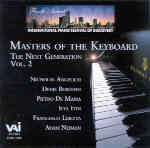Since 1998, the Miami International Piano Festival of Discovery has showcased young keyboard talents from all over the world. In turn, VAI aims to promote six of these promising pianists by way of a two-CD set culled from live, unedited festival performances. Adam Neiman’s fluent, technically rock-solid, and musicianly traversal of the sprawling Rachmaninov First Sonata crowns Disc 1. Granted, the close-up, airless engineering harshens the pianist’s flinty-enough sonority (as well as the piano writing’s orchestrally inspired tremolos and booming chords), yet the performance really moves. Annotator Frank Cooper refers to Nicholas Angelich’s “spacious” interpretations of the Brahms Four Ballades Op. 10. To my ears, Angelich picks at the First Ballade’s opening section, with exaggerated dotted rhythms and superfluous distentions of phrase that pull focus from the music’s narrative flow. The pianist’s blunt, machine-like fingerwork in the Second and Third Ballades is accurate in the wrong way, but the Fourth Ballade’s reflective nature easily absorbs Angelich’s ruminative, improvisatory approach. Ilya Itin plays Tchaikovsky’s Op. 5 Romance and Mikhail Pletnev’s arrangement of the Adagio from Sleeping Beauty with admirable breadth and directness. However, his dry, hard-toned Liadov Musical Snuff Box misses the music’s delicate point.
Listeners accustomed to tersely argued, symphonically oriented Schubert Wanderer Fantasies à la Richter, Fleisher, Perahia, and Pollini will take issue with Pietro De Maria’s sectional ritards, fidgety accents, and not-so-purposeful rubatos (his mooning over the first movement’s episode in E-flat major, for instance). Yet you can’t deny the immense technical command and overall sweep De Maria brings to this often unwieldy score. Denis Burstein’s Chopin Polonaise offers convincingly sustained softer moments, but the fortes grow too loud too soon, and the melodies rarely sing to their fullest potential. He fares better with Miaskovsky’s note-spinning Intermezzo and Final Movement from the Fourth Piano Sonata.
Francesco Libetta’s prodigal strengths and curious weaknesses manifest themselves in this collection’s final numbers. Debussy’s Les collines d’Anacapri is ravishingly limpid, poetic, and pliable. By contrast, Libetta gets too bogged down in pianistic detail for much of Risler’s arrangement of Strauss’ Till Eulenspiegel to truly take wing in the manner of the work’s finest orchestral renditions. But when Libetta unleashes those pulverizing bass-register tremolos at the moment of Till’s execution, make sure you’ve turned down the volume, otherwise prepare to kiss your woofers and tweeters goodbye! Libetta signs off with a caressing, gentle Brahms Lullaby in his own transcription. When will this gifted pianist get around to recording his daring, up-to-tempo renditions of the complete Chopin/Godowsky Etudes?
































